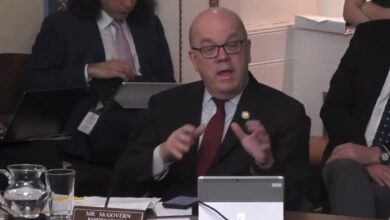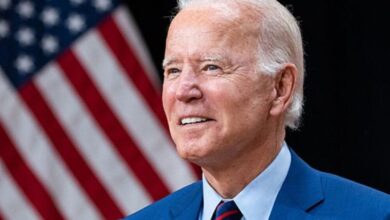Top Democrat Leaves Door Open For Raising Debt Limit In Lame Duck Session

If Republicans prevail in the midterm elections next month, Democrats are going to have just two months before they lose control of Congress to cram in keeping the government open, passing same-sex marriage protections and getting through a big defense policy bill.
And if they want President Joe Biden’s presidency to have a fruitful second half, they may have to add another item to their list: raising the debt ceiling.
In 2011, Republicans in the House held a debt ceiling increase hostage until President Barack Obama signed into law caps on annual spending. While the caps were only mildly successful in restraining spending, the fight to get them brought the U.S. government within days of a potential first-ever default and resulted in the first downgrade of federal debt by a ratings agency.
With a repeat of the 2011 situation likely if Republicans win either the House or Senate — but with probably even greater GOP reluctance to raise the debt limit this time around — Rep. Richard Neal (D-Mass.), chairman of the House Ways and Means Committee, told HuffPost he’d consider dealing with the debt ceiling in the post-election lame duck session instead.
“I’d be open to it, yes,” he said last week. “We’ll wait and see.”
While the debt ceiling has long been held hostage almost exclusively by Republicans, the U.S. has yet to default — and when push has come to shove in the past, the limit has been raised.
“Whenever the debt ceiling is used as a political cudgel, it’s dangerous to our democracy and financial standing in the world.”
– Rep. Richard Neal (D-Mass.)
But there’s reason to think that calculus could change with a Republican House or a Republican House and Senate. While many House Republicans in 2011 had been elected as tea party candidates, much of the Republican conference had been through previous showdowns and knew a default would be catastrophic to America’s finances.
But incoming GOP freshmen will be more strident than their tea party ideological forebears, and many of the rank and file who supported debt limit increases in past deals have been beaten in primaries or retired, making the job of a potential Speaker Kevin McCarthy (Calif.) that much harder.
The debt recently topped $31 trillion and is only a few hundred billion away from reaching its congressionally set ceiling of $31.381 trillion. In federal budget terms, that’s only a few bad money-losing months away, at least before the spring tax receipts start pouring in. Treasury’s “extraordinary measures” — basically, accounting maneuvers — would probably net a few extra months, but even that would only push the “drop dead” date to the fall or even possibly the late summer.
Dealing with the debt limit in the lame duck session, when Democrats could pass it without any GOP votes, would be tough sledding, though. There are already a number of contentious issues lined up, including another deadline to keep the government open.
In addition, Democrats would have to pass a budget outline in both chambers, put vulnerable senators in the 2024 cycle on the line for not one but two daylong rapid-fire series of votes called vote-a-ramas and, again, not lose any votes on their own side. They’d also be criticized for breaking precedent by dealing with such a controversial topic after they lost an election rather than waiting until the new Congress.

EVA HAMBACH via Getty Images
But with Republicans already using the big price tags of the American Rescue Plan and the Inflation Reduction Act to hit Democrats as profligate spenders, the debt will be an even bigger political albatross than usual.
Even a simple vote to keep the government funded before lawmakers left for the midterm campaign stretch was almost solely a Democratic affair. Only 10 House Republicans voted in favor, despite the temporary funding bill being devoid of controversial add-ons. Five of those ten — Reps. Fred Upton (Mich.), John Katko (N.Y.), Chris Jacobs (N.Y.), Anthony Gonzalez (Ohio) and Adam Kinzinger (Ill.) — will not be returning for the 118th Congress.
Reportedly, Republican leaders are already dreading the prospect, with one Senate aide telling Axios, “I expect this will be one of the first conversations [Republican Senate Leader Mitch] McConnell has with McCarthy.”
Democrats have generally been reluctant to try to use the debt limit in the same manner as Republicans, portraying it as necessary to pay off debt already incurred. Neal hewed to that line.
“Whenever the debt ceiling is used as a political cudgel, it’s dangerous to our democracy and financial standing in the world,” he said.
On the Senate side, Finance Committee Chairman Ron Wyden (D-Ore.) sounded less open to the idea than Neal, but also did not dismiss it.
“I don’t do speculative kind of scenarios, particularly when everybody says, ‘Oh, Republicans are going to win,’” he said.
“Republicans aren’t going to win; we’re going to beat ’em. And I’ll have more to say down the road.”




